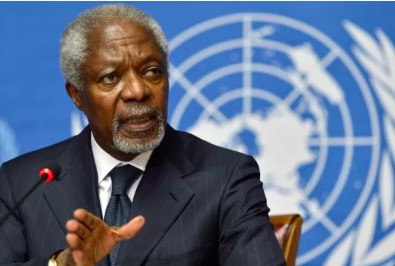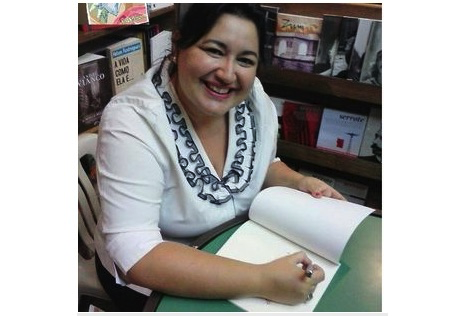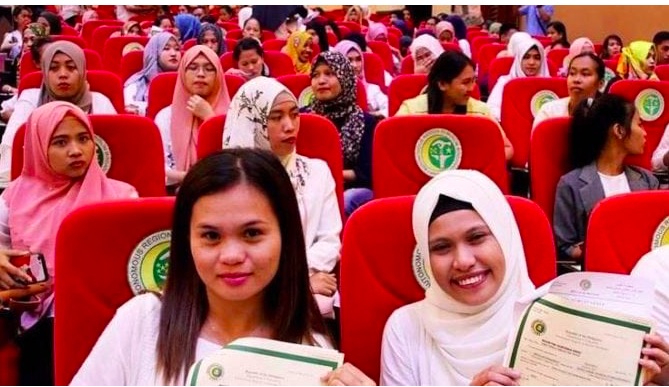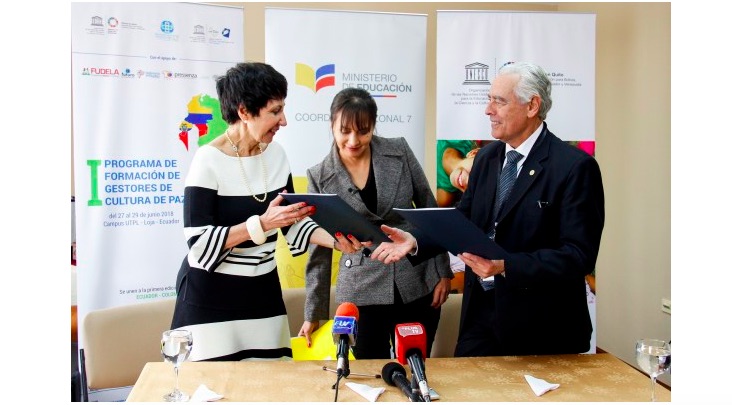… EDUCATION FOR PEACE …
An article by Tony Robinson from Pressenza
Early readers from the first days of Pressenza will remember Isabelle Bourgeois as a passionate journalist who joined the Base Team of the World March for Peace and Nonviolence. Almost every day, Isabelle would upload a video summary of the day’s events, telling both the serious and humorous sides of the journey.
In fact, Isabelle is a professionally trained journalist who has worked in war zones such as Iraq, Ethiopia and Kosovo for the Red Cross, but despairing of the one-sided stories portrayed in the media, Isabelle abandoned mainstream journalism and has set off to follow her own dream, driven by a profound purpose: to seek out joy in the world and to transmit it to as many people as possible.
As I know Isabelle very well from the time we shared on the World March, she called me a few weeks ago to say she was on her tour called “Joy for the Planet” and wanted to come and see what inspiring people she could find in Hungary. I realised that after 6 months’ sleeping in her camper van, she’d probably welcome the spare bed and hot shower I could offer her! So to Budapest she came and I helped out while she met up with a young Japanese ballet dancer who she was in contact with and who offered to be a subject in a video to spread joy through dance. We spoke a lot about her project, her purpose and the future.
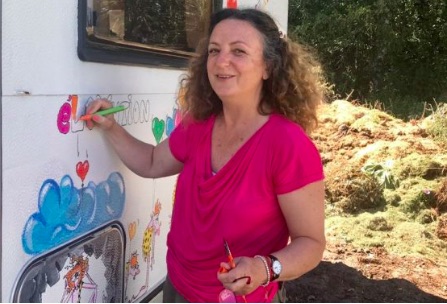
Isabelle decorates her beloved vehicle and home for 2018 (Image by Joy for the Planet)
One has the impression with Isabelle that she is being guided by a great force. What seems to be a coincidence at first, later on always feels like it was meant to be. As she says herself, “I’m the right person at the right place, at the right time with the right people.”
I took the opportunity to interview her for Pressenza and offer her her old role back!
Pressenza: What is Joy for the Planet? Tell us about this project.
Isabelle Bourgeois: Joy for the planet is a journey around the world but starting with a tour through Europe, with my camper van that I’ve called Begoodee, in order to promote and share joy, enthusiasm and passion through meeting inspiring people. I’m a journalist and all my life I’ve been dedicated to promoting and sharing positive news, inspiring news, through the media and I wanted to bring my own contribution to improve humankind, somehow, on a very humble level. So the idea is to travel throughout Europe for one year with the gift that I’m born with and with my experience as a journalist, with my camera, with my microphone and pencil and some drawings. I’m bringing joy and sharing joy as a volunteer through videos, articles and interviews.
PZ: I see that as part of the project, in every place you go, you look for inspiring people who you award with the title nominee of joy and give them a solar lamp. What’s that about?
IB: The idea again is to bring trust and faith, but faith not in a religious sense, faith in yourself, faith in your life’s mission, faith in the purpose that you are living on Earth. So the idea is to build bridges instead of fear, instead of walls, to show how much beauty there is in the world and how many great and inspiring people there are. And on the road, in order to show the light that goes from person to person helping each other and being passionate about their lives, I found a concrete way to symbolize this transmission of love and passion with a little solar lamp.
So on the road, in a way which is not at all planned or controlled, something totally spontaneous, I might meet some people; adults, disabled people, children who are willing to build solar lamps with me. So they add their light to this project, they add their love, they add their hopes, by building these little lamps. And on the road I offer these lamps to inspiring people who dedicate their lives to others, or who bring better living conditions for us.
PZ: What led you to take on this great adventure?
IB: For the last 25 years, I’ve been a journalist and at the beginning I was a regular journalist, writing about gossip, violence and scandals; nothing that actually helps anyone to evolve and I was also working as a humanitarian delegate in war-torn countries. And being in war zones I was surprised to see so much love, solidarity, great behaviour and forgiveness from all parties involved in the conflict. But in the evening when I came back home and switched on the TV, the media were only talking about terrorism, bomb attacks, violence and blood, and I said that there’s something here which isn’t right, because I’m in the middle of the war and I see so much beauty also, so much love, so much peace and I thought, “Oh, there’s a kind of conscious manipulation by omitting what makes people human beings.” And I didn’t want to take part in that lie anymore because this war and violence is a reality but it’s not the reality. And I witnessed also another reality which is solidarity, helping each other, forgiving and so 15 years ago I decided to create a good news website – somehow similar to Pressenza – on a voluntary basis and I decided to quit mainstream journalism for good, because it contributes much more to increasing fear, hate and judgment among people than to bringing trust and inspiring solutions. So this was the first thing I did.
And then I tried as a freelance journalist to publish good news, inspiring news, but most of the media said, “Good news is not news, Isabelle,” and, “You’re too idealistic, you’re too naïve.” Really, I was hitting my head against a brick wall for many years, wanting to show that other side of reality.
So in the mean time I created other projects like, for instance, Planet Positive Action which is a travel company that organises solidarity tours.
(Article continued in right column)
(continued from left column)
It’s about travellers who visit a country while at the same time helping and giving a meaning to the trip. So I did that while taking a bit more distance from journalism but I never gave up on the idea of really bringing my journalistic faculties to others because I love my job.
I think journalism is one of the most beautiful jobs in the world. So two years ago I said I will not give up on inspiring journalism or humanist journalism and I said, “But how can I bring my reportage, my features, my articles, if mainstream media are not that interested in publishing what I see and who I meet?” And so I said, “I’ll do it on my own, I’ll just find some money to buy a vehicle and I’ll jump into the world with my camera, my microphone, my pencil and I’ll just do it on my own. I will not wait any more for people to follow me in this. I’ll just do it.”
And I did some crowdfunding last November and I succeeded to collect eighteen thousand euros which was beyond my expectations because I was asking for fifteen thousand. And then I bought my second-hand old camper van and that’s it. I started my journey from Switzerland six months ago and this is how it happened, to make a long story short. Although the project only took shape two years ago, it’s really a life-time commitment.
PZ: On your journey so far from Switzerland with Begoodee, where have you been? And could you give us a couple of highlights for you?
IB: Yes. So I started in Switzerland then I went down to Sardinia, Corsica, France, Germany, Denmark, Norway, Finland and then I went through all the Baltic countries to Poland, and I landed now a few days ago in Budapest.
Highlights? Actually every day of that journey has been a highlight because I’ve met such unbelievable people, extraordinary people.
So for instance in Finland, I met Villé, a 25 years old young man who tried to kill himself when he was 16 years old because he couldn’t fit with that world. It was like he was parachuted on to a terrible planet he didn’t want to belong to. So he jumped off a cliff, and he told me, “I jumped from the cliff. I’ve lost two legs, but I found my joy.” And he was sharing with me what made him so joyful today and he said that it was this path that has nothing to do with what is visible, with materialistic issues; it’s about finding peace and loving everything whatever it is, beyond shape and form, beyond the physical. So he was really a fantastic person.
Also in Finland, I participated in the world championships of boot-throwing. This also I loved so much because it was kind of, when you’re going through a hard time and you have this total nonsense sport which helps you also to give a meaning to your life, because it helps you to take distance from drama and from seriousness. So I found it actually very therapeutic.
Also in the South of France I met a guy whose dream, he is 75 years old, was to cross the Atlantic inside a barrel.
I’ve met Buddhists, I’ve met Jewish people who are committed to bringing peace to the Middle East. I’ve met dancers who were dancing to bring all the nations together.
And I have rewarded – it’s not me actually it’s the project, because there is a big difference between me and the project – so the project has rewarded so far 36 or 37 nominees of Joy.
PZ: What’s the future for this project? Where are you seeing it in the future?
IB: Of course, the idea now is to build something that will remain, that will be useful for everyone. So this year’s journey is just for me a calling card to show to everyone that I want to give an example. So, I did it with all my love, with all my convictions. I did it and then I will write a book about this journey and I would like to make a movie because so far I’ve edited more than 60 videos but very short so I’d like to make a movie. And then with this movie, the journey (the experience), the writing and the film, I would like to create a kind of a place, a physical location, where people can experience joy: joy through art, joy through science (with quantum physics, for instance, how your thoughts are influencing your destiny), joy with music, joy and education, and so on. So, it will be a place where people can experience, in an interactive way, how to find the key to joy in life and how to live a dream, how to align your values with your actions.
PZ: What have you learned in these last six months?
IB: [Laughter] That I was right! I’ve learned somehow very deep, but I’ve learned that I was right to trust human beings. I was right all my life to trust human beings, and to see jewels within them. And people who behave badly, it’s not that they’re bad, it’s just that they didn’t have the chance to be loved enough to follow their dreams. So all the harm and the bad is coming from ignorance. It’s not coming from reality, rather from a source of negativity. It’s really an accident in a loving process in an individual’s path. So, I’ve learned that actually everyone is good and has a very beautiful ground but education factors have stopped them from remaining loving or a loved person. I’ve learned that I shouldn’t judge anymore what is right and what is wrong, because if you decide what’s right, what’s wrong, then you will feed the notion of duality and this is not at all what I would like to contribute. So by accepting light and dark, good and bad in a compassionate way, I believe that I contribute more to building this sense of oneness on earth.
PZ: And finally, what brings you joy?
IB: Of course, this project actually. There is joy in finding joy actually. So because all my life, I really felt joy despite the burdens, difficulties and troubles in my life, I never quit that deep feeling that everything has a purpose and that we’re not alone and that there’s a reason for all the turbulence in your life. So I never quit that underground stream of joy, but it was of course up and down, up and down, like as if I was going out of the flow and then back into the flow, and out of the flow and back again. But now, through this project I feel really that I’m non-stop in the flow of joy, non-stop, because I feel that I’m the right person at the right place, at the right time with the right people and that I’m really doing what I was born for, that I’m in my life’s mission.
PZ: Very good. Thank you and good luck!
(Thank you to Janet Hudgins, the CPNN reporter for this article.)
